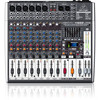Behringer XENYX X1222USB Manual - Page 14
Specifications
 |
View all Behringer XENYX X1222USB manuals
Add to My Manuals
Save this manual to your list of manuals |
Page 14 highlights
14 XENYX X1222USB User Manual Balanced ¼" TRS connector strain relief clamp sleeve ring tip sleeve ground/shield ring cold (-ve) tip hot (+ve) For connection of balanced and unbalanced plugs, ring and sleeve have to be bridged at the stereo plug. Fig. 4.4: ¼" TRS connector Insert send return ¼" TRS connector strain relief clamp sleeve ring tip sleeve ground/shield ring return (in) tip send (out) Connect the insert send with the input and the insert return with the output of the e ects device. Fig. 4.5: Insert send return ¼" TRS connector ¼" TRS headphones connector strain relief clamp sleeve ring tip sleeve ground/shield ring right signal tip left signal Fig. 4.6: ¼" TRS connector for headphones 5. Specifications Mono Inputs Microphone Inputs (XENYX Mic Preamp) Type XLR, electronically balanced, discrete input circuitry Mic E.I.N. (20 Hz - 20 kHz) @ 0 Ω source resistance -134 dB / 135.7 dB A-weighted @ 50 Ω source resistance -131 dB / 133.5 dB A-weighted @ 150 Ω source resistance -129 dB / 130.5 dB A-weighted Frequency response













